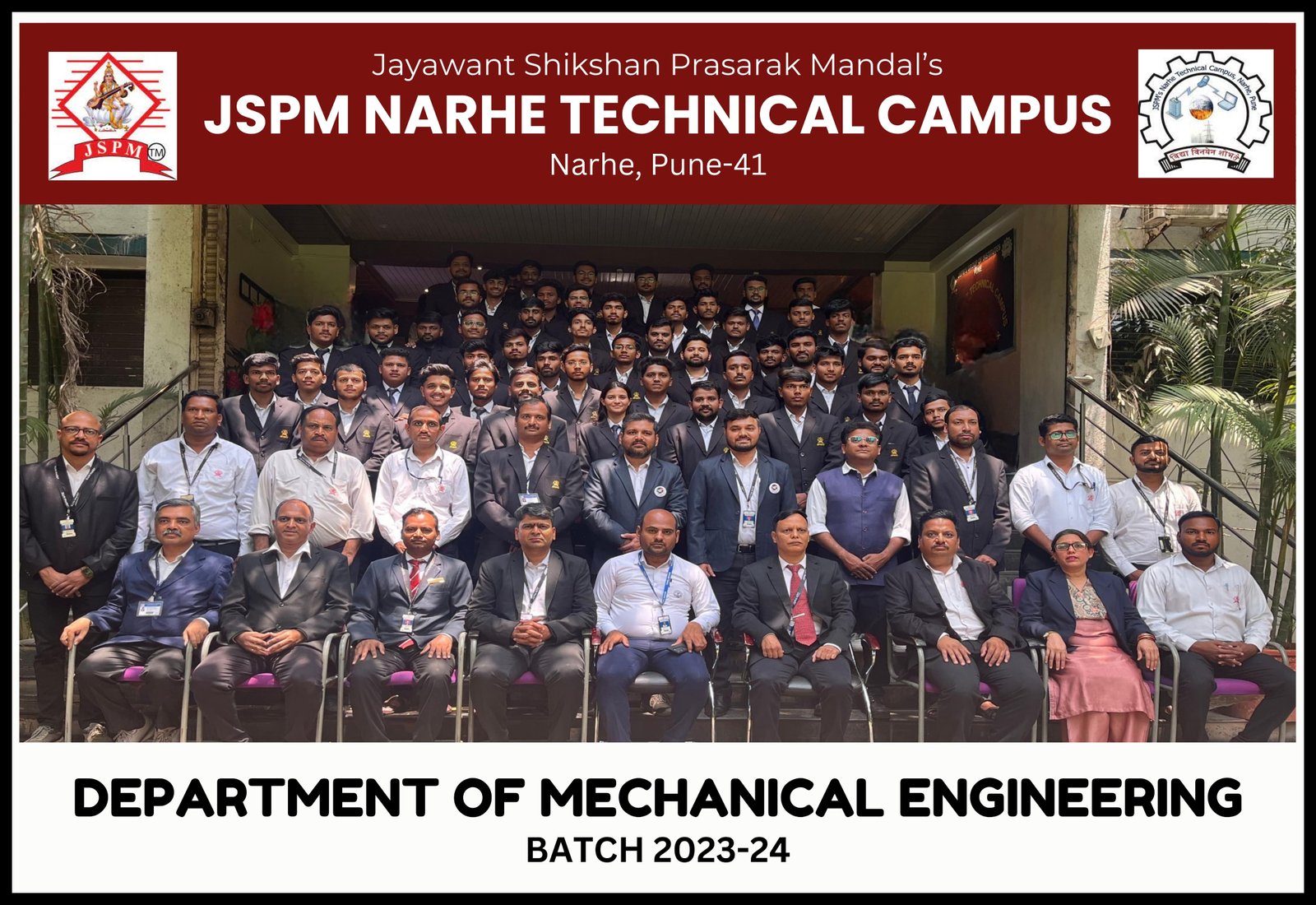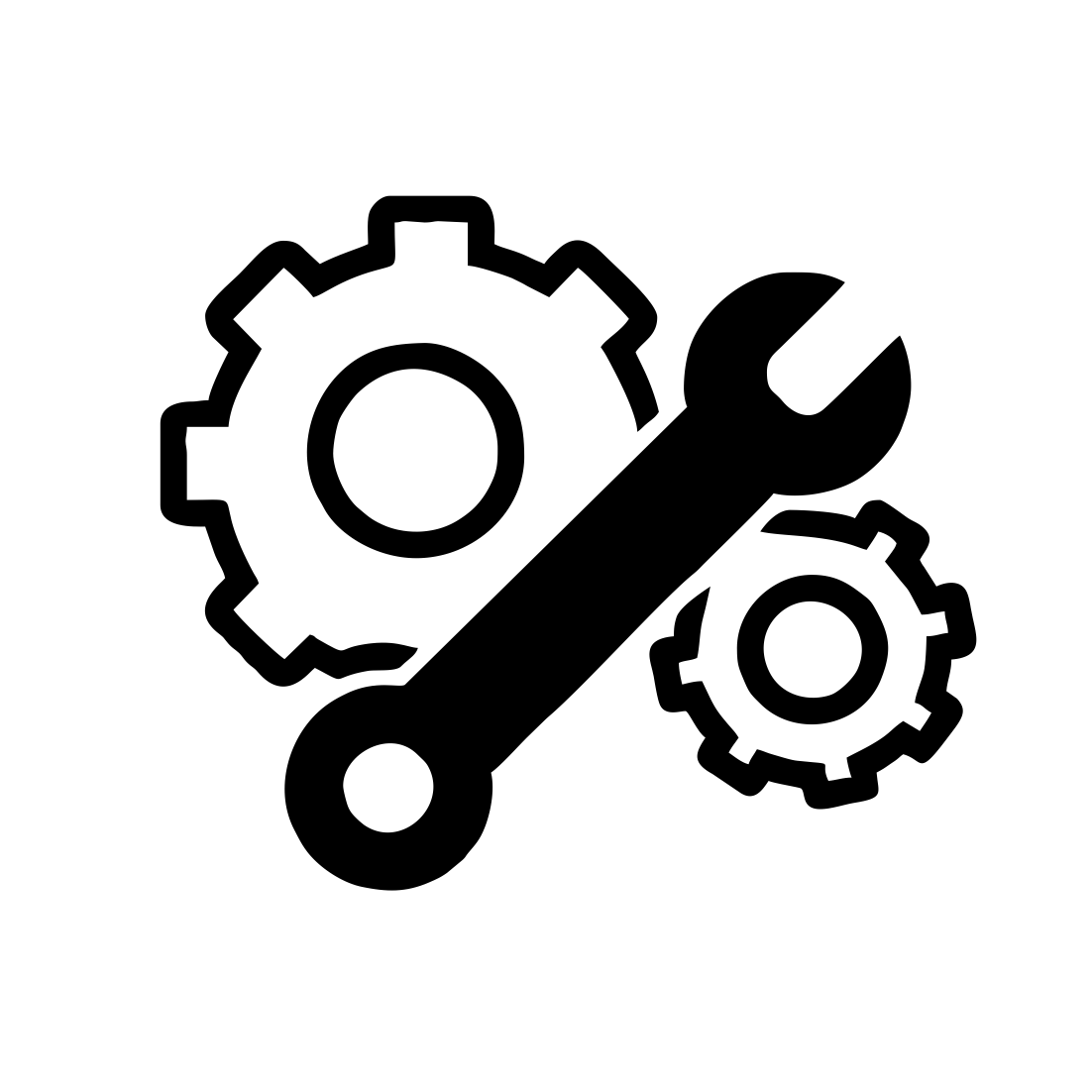JSPM Narhe Technical Campus, Narhe, Pune
S No 12-1-2 and 12-2-2 Narhe, Taluka- Haveli, Near Sanas Crane, Pune-Bangalore Highway, Pune, Maharashtra 411041
Landmark: Navale Bridge, Behind Swami-narayan Temple Narhe
Approved By AICTE & Affiliated To Savitribai Phule Pune University.
Institute Code : 6755
ACCREDITED BY NAAC
Mechanical Engineering
"The Department of Mechanical Engg.is headed by Prof. Pradeep A. Patil and is supported by a team of 38 teaching and 15 non-teaching staff. The department consists of 15 well-equipped laboratories with a total investment of Rs.13, 898,616.99. The students of Mechanical Engg. have formed an association Mechanical Engineering Students’ Association (MESA) on 20th march 2006 under the guidance of DOME staff."
Vission
Human Excellence through Technical Education and Research
Mission
M-1 To equip students with required competency and skill in domain of Engineering and research through teaching-learning and practice for their successful professional career
M-2 To provide smart and sustainable solutions to societal and industrial problems through student involvement, thereby fostering their creativity and innovativeness
M-3 To develop entrepreneurial inclination among students for contributing to the national growth
Program Educational Objectives (PEO)
Graduates of Mechanical Engineering shall be able to
PEO-1. Pursue higher education and research in a premier institute.
PEO-2. Solve societal and industrial problems by applying knowledge and skills gained during the course of studies.
PEO-3. Explore the opportunities in the development of engineering solutions through research and development for the benefit of mankind.
Program Specific Objectives (PSO)
PSO-1. Analyze, design and evaluate mechanical components and systems using state-of-the-art IT tools.
PSO-2. Analyze, design and evaluate thermal systems including IC engines, refrigerating, air-conditioning, and power generating systems.
PSO-3. Plan, including methods design, process plan, process automation, and quality assurance systems for manufacturing of given mechanical components and systems.
PSO-4. Apply modern management methods to manufacture of components and systems.
Program Outcomes (PO)
The students of an undergraduate program in Mechanical Engineering will have
PO-1: Engineering knowledge: Apply the knowledge of mathematics, science, engineering fundamentals and an engineering specialization to the solution of complex engineering problems.
PO-2: Problem analysis: Identify, formulate, review research literature and analyze
complex engineering problems reaching substantiated conclusions using first principles of mathematics, natural sciences and engineering sciences.
PO-3: Design/development of solutions: Design solutions for complex engineering problems and design system components or processes that meet the specified needs with appropriate consideration for the public health and safety and the cultural, societal, and environmental considerations.
PO-4: Conduct investigations of complex problems: Use research-based
knowledge and research methods including design of experiments, analysis and interpretation of data and synthesis of the information to provide valid conclusions.
PO-5: Modern tool usage: Create, select, and apply appropriate techniques, resources and modern engineering and IT tools including prediction and modeling to complex engineering activities with an understanding of the limitations.
PO-6: The engineer and society: Apply reasoning informed by the contextual
knowledge to assess societal, health, safety, legal and cultural issues and the consequent responsibilities relevant to the professional engineering practice.
PO-7: Environment and sustainability: Understand the impact of the professional engineering solutions in societal and environmental contexts, and demonstrate the knowledge of, and need for sustainable development.
PO-8: Ethics: Apply ethical principles and commit to professional ethics and responsibilities and norms of the engineering practice.
PO-9: Individual and teamwork: Function effectively as an individual, and as a member or leader in diverse teams, and in multidisciplinary settings.
PO-10: Communication: Communicate effectively on complex engineering activities
with the engineering community and with society at large, such as, being able to comprehend and write effective reports and design documentation, make effective presentations, and give and receive clear instructions.
PO-11: Project management and finance: Demonstrate knowledge and understanding of the engineering and management principles and apply these to one’s own work, as member and leader in a team, to manage projects and in multidisciplinary environments.
PO-12: Life-long learning: Recognize the need for, and have the preparation and ability to engage in independent and life-long learning in the broadest context to technological change.
About MESA
MESA is JSPM NTC Mechanical Student association. The MESA was formed to bring about the technical development of students by organizing seminars, workshops and other activities and also to improve non technical abilities of students by engendering good communication skills, managerial abilities, presentation skills and team work.
Objectives
1. To develop organizational skills among the students.
2. To facilitate different forums of student members like Innovation Club forum, Paper Publications Forum, Extracurricular Activity Forum, Academic Forum etc.
3. To develop leadership skills among students.
4. To conduct different technical events for students within and outside the department.
5. To ease functioning of student related activities.
Faculty Advisor
Prof. A. D. Halwe
.png)
.png)


Dr. M. A. Kumbhalkar
Head of DepartmentPh.D. (Mechanical Engineering)
head_mech2@jspmntc.edu.in
Dr. Suhas H. Sarje
ProfessorPh.D. (Mechanical Engineering)
suhassarje7235@gmail.com
Dr. Sachin L. Borse
ProfessorPh.D. (Mechanical Engineering)
sachinlb@yahoo.co.uk
Dr. Dhage Sagar Bhimraj
Associate ProfessorPh.D. (Mechanical Engineering)
sagardhagejspm@gmail.com
Dr. Mahendra U. Gaikwad
Assistant ProfessorPh.D. (Mechanical Engineering)
mahendragaikwada1@gmail.com
Dr. Pradeep U. Gaikwad
Assistant ProfessorPh.D. (Mechanical Engineering)
pradeepgaikwad9226@gmail.com
Dr. Madhuri S. Deokar
Assistant ProfessorPh.D. (Mechanical Engineering)
madhurisdeokar@gmail.com
Dr. Aboli D. Halwe
Assistant ProfessorPh.D. (Mechanical Engineering)
abolidh@gmail.com
Dr. Nand Jee Kanu
Assistant ProfessorPhD in Mechanical Engineering (Sardar Vallabhbhai National Institute of Technology, Surat, India)
nandssm@gmail.com